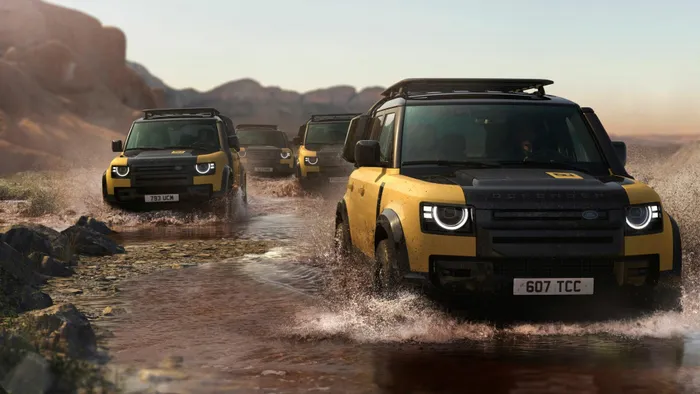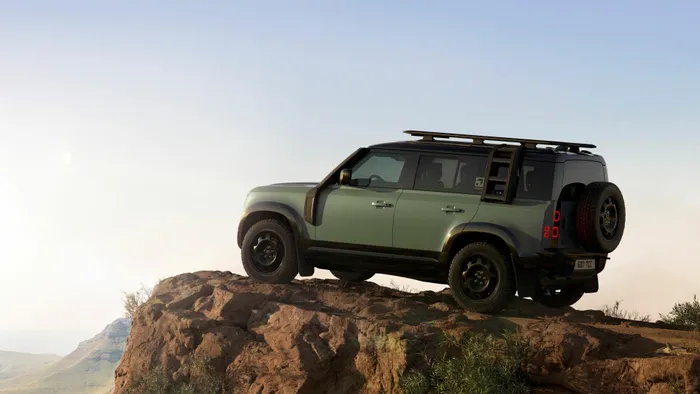From Camel to Defender: the Collins family's impact on Land Rover's legendary Trophy revival

South African couple Mark and Belén Collins are an integral part of the new Defender Trophy.
Image: Supplied
When Mark Collins talks about the Camel Trophy, his eyes still light up as if it were yesterday.
“My brother and I were lucky enough to be in the South African team in 1998,” he recalls.
“We drove a Freelander, and the traction control made all the difference on frozen lakes. Each team also had a Defender to carry the bikes, skis and camping gear. It was literally life-changing.”
For Belén Collins, the memories are just as vivid. In 1995, she was part of the Spanish team for the Mundo Maya event across Mexico and Central America.
“I was the first woman from Spain to take part, and we drove a Discovery. Back then, it was one car per country, and even the journalists travelled with us. Three weeks of pure adventure, it completely changed my life.”
Rebirth
The Camel Trophy, often dubbed the “Olympics of Adventure,” is legendary. Looking back at the old footage on YouTube, it’s clear that health and safety regulations today would never allow the dangerous river crossings, jungle treks and extreme endurance tests that once defined it.
Yet for both Mark and Belén, who met at the 1998 Camel Trophy, its spirit is returning with the rebirth of the Defender Trophy.
“Of course, times have changed,” says Mark. “But what we’re trying to do is capture that essence - that mind-blowing factor - while making it contemporary and accessible. This isn’t just about adventure for adventure’s sake. The Defender Trophy is underpinned by purpose, with conservation at its heart.”
Conservation
That conservation link is strengthened through Land Rover’s partnership with Tusk, the international wildlife charity. For Mark, who is already deeply involved in rhino protection projects in South Africa, it’s personal.
“We’re immersed in the bush here, working hands-on with rhino conservation. Bringing that into the event gives participants the chance to be part of something bigger than themselves.”
Both Collinses are directly involved in shaping the new chapter. Mark works on scouting and conceptualising the international event, while together they help oversee the South African team’s selection process.
“Applicants go through an online questionnaire before interviews. They need to be over 23, reasonably fit, have driving experience, be able to swim, and speak English. You don’t have to be a superhuman athlete - what matters is spirit, adaptability and a sense of adventure,” Belén explains.

The Defender 110 Trophy Edition celebrates Defender’s return to global adventure challenges with a distinctive expedition-ready specification.
Image: Supplied
Multi-disciplinary
The modern Defender Trophy will be multi-disciplinary, drawing on a mix of physical, mental and navigational challenges. Technology, too, will play a part - GPS, route mapping and geo-tagging will complement rather than complicate the experience.
“In our day, just learning to use a GPS was a huge challenge,” laughs Mark. “Now it’s on your phone. Technology will enhance the event, not hold anyone back.”
Family legacy
For the Collins family, the Defender legacy runs deep. Mark’s brother and sister-in-law were also Camel Trophy participants, and now their daughter Carla is keen to follow in their tracks.
“It’s part of our family fabric,” Mark says. “To see our children excited by the same dream is incredibly rewarding.”
Even with years of global event experience behind him, Mark says the Defender Trophy is still the litmus test: “Having done my share of adventure challenges around the world, I can say this is the one you want to be part of. It changed our lives, and now it’s back, with even more meaning thanks to its conservation mission.
“It’s a critical thing for us, making sure we get the right calibre of entrants,” Mark stresses. “The whole event hinges on the standard of who enters. That’s why we’re encouraging people to get online and apply; it’s a very simple form. Entries close on 30 September, so we’re running out of time.”
Format
Early next year, regional finals will identify the national winners who will head to Africa for the global final in 2026.
More details of the final’s format will follow, but global finalists will go up against one another across a series of stages hosted in Africa with Defender conservation partner Tusk.
Competitors will be scored individually but compete in pairs, with the lowest-ranked competitor given the first pick of potential teammates ahead of each stage.
Each stage will see the teams complete a variety of driving challenges, ingenuity challenges and physical challenges.